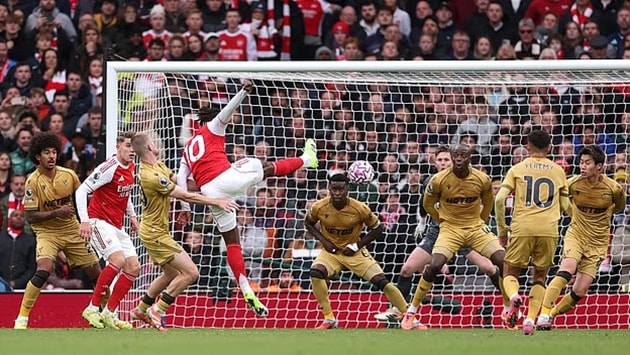Arsenal lead the dead-ball revolution in the Premier League
19% of Premier League goals in 2025/26 have come from corners – a record this season. Arsenal have scored 11 dead ball goals (69%), Brentford used a throw-in to open the scoring against Liverpool.
Arsenal are leading the Premier League’s “dead-ball revolution” in 2025/26. 19% of all goals have come from corners – the highest rate in the history of the competition. In that picture, Arsenal have scored 11 goals from set-pieces, accounting for 69% of their total, demonstrating a level of organisation and efficiency that is unrivalled.
Defining weekend: Everton collapses due to corner kick, Brentford beats Liverpool from throw-in
Before last round, Everton were the only team yet to concede from set pieces. But they lost 3-0 to Tottenham, both goals coming from corners scored by Micky van de Ven. In the same round, Brentford beat Liverpool 3-2; Dango Ouattara’s opener came from a long throw-in – a prime example of meticulous set piece preparation.

Arsenal: discipline, physicality and tactical details
Coach Mikel Arteta has built an Arsenal team that is physically strong, disciplined in every movement and especially intense in dead ball situations. Centre-back Gabriel has been praised by Jamie Carragher as “the most influential player in the league right now” – not only in his role in attacking aerial duels but also in organizing the positional framework for his teammates to exploit space.
In corner situations, Arsenal optimize both the near and far posts, using cover, positional changes and diagonal runs to open up shooting angles. As the frequency and quality of dead balls increase, the number of goals from set pieces becomes a steady source of profit – true to the philosophy of finding “the smallest profit” in modern football.
Dead ball goal map: numbers don't lie
19% of the league’s goals came from corners – an all-time high. Arsenal scored 11 goals from set pieces, 69% of their total. With the competition getting tougher, this performance allowed Arsenal to maintain their lead without relying entirely on open play.

Brentford: long throw-ins are a weapon
Under Thomas Frank, Brentford turned the long throw-in into a real goal-scoring game. Each throw-in was a designed second ball: contesting the landing spot, clearing the six-yard box, and forcing attackers into open space. The 3-2 win over Liverpool, with the opening goal from a throw-in, was a testament to the value of detailed coaching and repetition.
Mid-range teams take advantage
Bournemouth have scored five goals from set pieces and are currently second in the table. Tottenham have a similar record and are just behind. For teams without overwhelming attacking firepower, a high conversion rate from set pieces is a lever to keep up with the top group.
Dead ball defense decides the game
In contrast, Nottingham Forest and West Ham have both conceded 10 goals from set pieces and are struggling at the bottom. As the margin of points between teams narrows, defending corners, free kicks and throw-ins well is not just a small detail but can decide the final standings of the season.
Key statistics by source
| Team/Statistics | Figures stated in the source |
|---|---|
| Full season (2025/26) | 19% of goals come from corners – highest in history |
| Arsenal | 11 goals from dead balls, accounting for 69% of total goals |
| Everton | Before the last round: no goals conceded from dead balls; lost 0-3 to Tottenham with 2 goals from corner kicks |
| Brentford | Beat Liverpool 3-2; Dango Ouattara's opening goal came from a long throw-in |
| Bournemouth | 5 goals from dead balls; ranked second |
| Tottenham | Dead ball performance similar to Bournemouth; right behind |
| Nottingham Forest, West Ham | Each team conceded 10 goals from dead balls |
Tactical significance: science and performance
The debate over “aesthetics” will continue, but tactical evolution is a reality: dead balls are now a test of discipline, data analysis and muscle power. When this formula delivers consistent results, from Arsenal to Brentford, from Bournemouth to Tottenham, to ignore it is to undercut your competitiveness.
The message of the season is clear: if you can't neutralize them, learn to play dead ball – where the smallest percentages are determining the biggest results.
